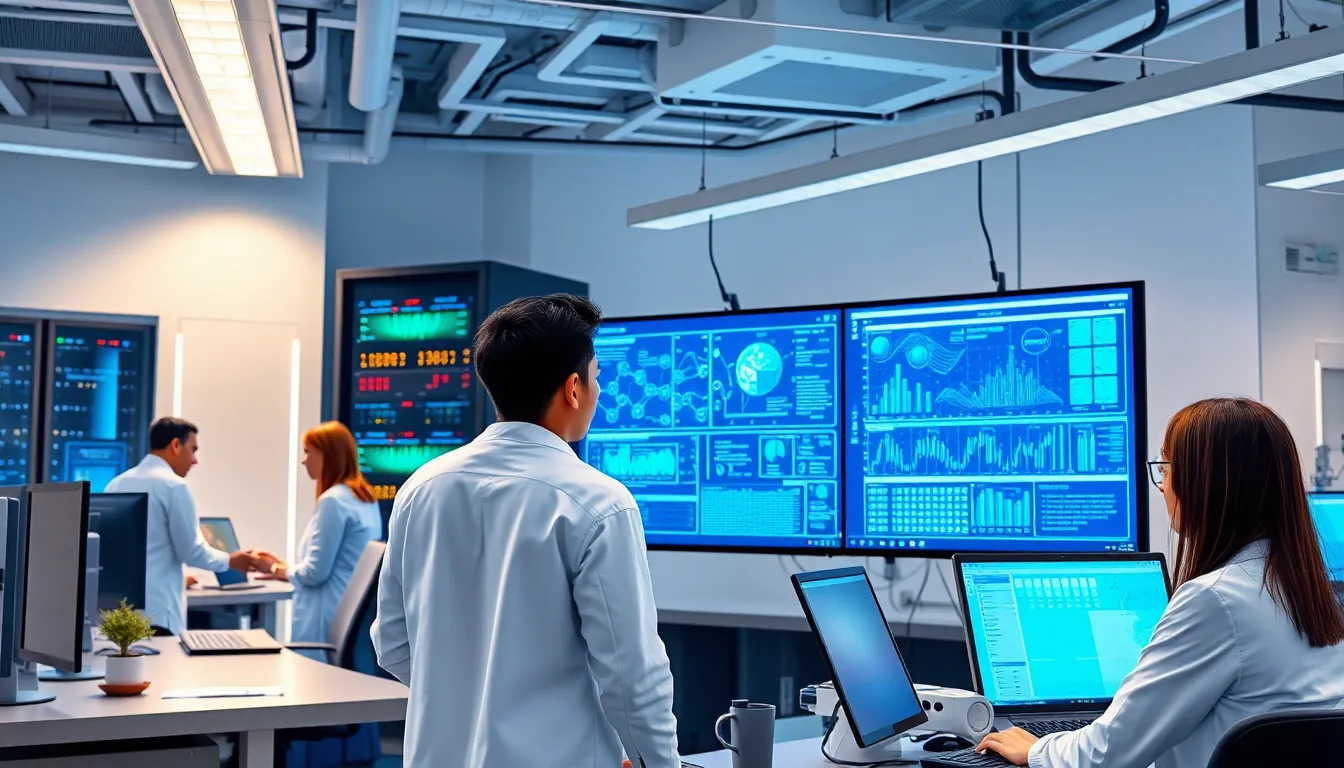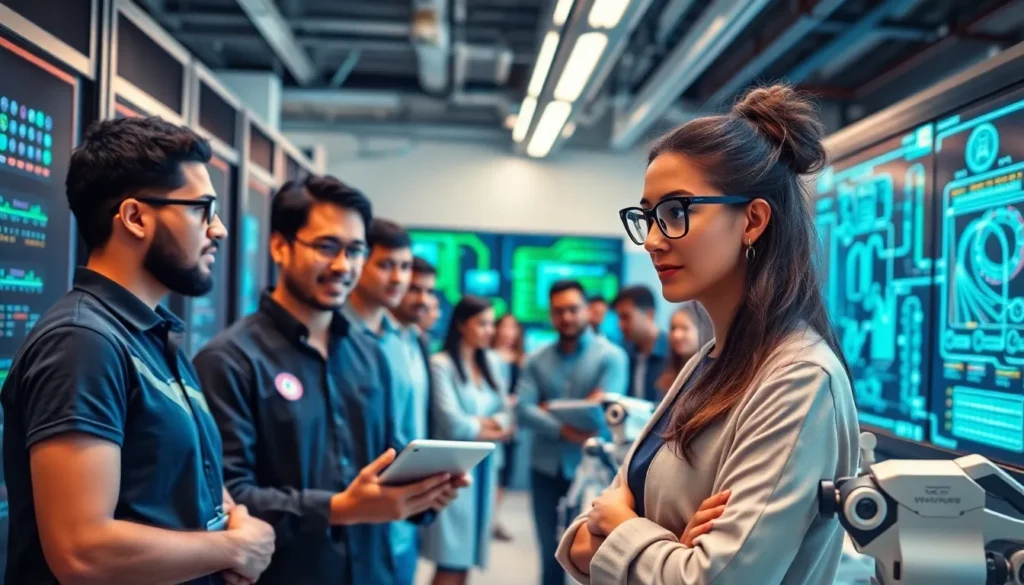In a world where robots might soon take over the coffee-making duties, artificial intelligence labs are at the forefront of innovation. These high-tech havens are where brilliant minds and cutting-edge algorithms collide, creating everything from chatbots that can hold a conversation to self-driving cars that might just beat you to the grocery store.
Table of Contents
ToggleOverview of Artificial Intelligence Lab
Artificial intelligence labs serve as pivotal hubs for technological advancement. These facilities bring together researchers, engineers, and data scientists, all focused on pushing the boundaries of AI capabilities. Innovations emerging from these labs include machine learning algorithms, robotics applications, and natural language processing systems.
Experts utilize sophisticated tools and environments to experiment with various AI models. Focus areas often comprise computer vision, reinforcement learning, and neural networks. Through collaborative efforts, teams refine algorithms to enhance performance and achieve specific objectives.
Cutting-edge projects reveal the potential of AI across industries. Autonomous vehicles benefit from AI lab research, enabling systems that detect and respond to surroundings in real-time. In healthcare, AI labs work on predictive diagnostics and personalized medicine, improving patient outcomes.
Data plays a crucial role in AI development. Large datasets enable labs to train algorithms, ensuring robustness and accuracy. Continuous evaluation and iteration of models result in breakthroughs, often published in reputable journals and conferences.
Many AI labs engage in partnerships with academia, government, and private sectors. These collaborations foster a rich exchange of ideas, accelerating growth and innovation. Labs often produce prototyped technologies that transition into real-world applications, reflecting the impact of rigorous research.
The dynamic environment of an AI lab not only nurtures current talent but also attracts future innovators. Entry-level positions offer valuable experience, while internships provide insight into advanced AI research. The culture in these labs emphasizes exploration, creativity, and the relentless pursuit of knowledge.
Key Components of an Artificial Intelligence Lab

Artificial intelligence labs rely on essential components for their success. The integration of technology, infrastructure, research, and development fosters innovation and drives advancements in AI.
Technology and Infrastructure
Advanced computational resources play a vital role in AI labs. High-performance servers enable the processing of large datasets quickly. Implementing cloud computing allows researchers to scale experiments seamlessly. Specialized software, such as TensorFlow and PyTorch, supports machine learning and deep learning projects. Robust networking infrastructure ensures data flows efficiently across teams. Incorporating storage solutions maintains the integrity of vast datasets. Effective infrastructure underpins every successful AI initiative.
Research and Development Focus
Focused research drives breakthroughs in AI labs. Prioritizing areas like machine learning, natural language processing, and computer vision shapes ongoing projects. Collaboration among researchers, engineers, and data scientists enhances problem-solving capabilities. Exploring real-world applications often leads to meaningful results. Strategic partnerships with academic institutions, industry leaders, and government organizations facilitate knowledge exchange. Gathering and analyzing data remains a cornerstone of research efforts. A dedicated approach to development ensures continuous advancements in the field.
Types of Research Conducted
Various types of research take place in artificial intelligence labs, driving innovation and technological advancements. Focused efforts in specialized areas lead to significant contributions across multiple sectors.
Machine Learning and Algorithms
AI labs prioritize machine learning, developing advanced algorithms for prediction and classification tasks. Researchers enhance accuracy by experimenting with neural networks and ensemble methods. Data preprocessing and feature engineering play vital roles in achieving optimal results. These techniques enable models to learn from vast datasets, ultimately improving decision-making processes. Applications range from finance to healthcare, showcasing the versatility of machine learning in solving real-world problems.
Robotics and Automation
Significant interest in robotics and automation characterizes research within AI labs. Engineers design intelligent systems capable of performing tasks autonomously, enhancing efficiency across industries. Robotic technologies utilize sensors and computer vision for navigation and object recognition. Collaborative robotics, or cobots, work alongside humans in various settings, improving productivity. Development in this area has led to advancements in manufacturing, logistics, and service industries, revolutionizing workflows and operational capabilities.
Collaboration and Partnerships
Collaboration among various entities accelerates advancements in artificial intelligence. AI labs rely heavily on partnerships with academic institutions and industry leaders to enhance research outcomes and broaden applications.
Academic Institutions
Academic institutions play a key role in AI lab collaborations. Researchers from universities offer cutting-edge knowledge and insights, which greatly influence the direction of AI projects. Institutions often provide access to large datasets and computing resources, allowing for more comprehensive experiments. Joint initiatives between labs and universities lead to innovative research papers, stimulating further exploration in AI methodologies. Programs focusing on internships and fellowships partner students with professionals, fostering skill development in real-world projects.
Industry Collaborations
Industry collaborations significantly shape the output of AI labs. Companies contribute practical challenges that drive research focus, aligning academic theories with market needs. Specialized programs, startups and tech giants engage with labs to develop solutions tailored to specific sectors. Such partnerships enable rapid prototyping and testing of AI technologies, ensuring quicker deployment into the marketplace. Relationships with industry leaders also offer financial support and access to proprietary data, enhancing the effectiveness of AI models.
Future Trends in Artificial Intelligence Labs
Artificial intelligence labs are poised to drive remarkable developments in numerous fields. Enhanced algorithms for machine learning and deep learning will continue to emerge, increasing efficiency and effectiveness. Research will emphasize ethical AI, focusing on transparency and bias reduction in algorithmic decision-making.
Collaboration among global AI labs will foster knowledge sharing, resulting in shared advancements. An increase in the use of quantum computing is anticipated, drastically improving data processing capabilities. Diverse applications in healthcare, finance, and transportation will show the versatility of AI technologies.
AI labs will adopt more interdisciplinary approaches, integrating insights from neuroscience, psychology, and ethics. This integration can lead to breakthroughs in creating human-like interactions in AI systems. Significant growth in natural language processing will enable machines to understand and generate human language with greater nuance and context.
In addition, partnerships with startups will become increasingly common, allowing labs to leverage innovative ideas and fresh talent. More organizations will seek to establish in-house AI labs, as the demand for AI solutions continues to rise. As a result, competition among labs will fuel rapid advancements in technology and application.
Investments in automation technologies will continue to reshape industries, with a focus on developing intelligent systems that enhance human tasks. AI-powered robotics will play a crucial role in manufacturing, logistics, and service sectors. These trends highlight an exciting future where artificial intelligence labs remain at the forefront of technological evolution, creating solutions that benefit society.
Artificial intelligence labs are at the heart of technological progress. They cultivate innovation by combining advanced algorithms with the expertise of researchers and engineers. The collaborative environment fosters creativity and exploration, leading to breakthroughs that transform industries.
As AI continues to evolve, these labs will play a crucial role in developing ethical AI and addressing societal challenges. Their partnerships with academia and industry will enhance research outcomes and expedite the deployment of AI technologies. The future promises exciting advancements that will redefine how humans interact with machines, making AI labs essential to the ongoing evolution of technology.

